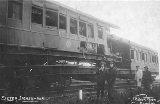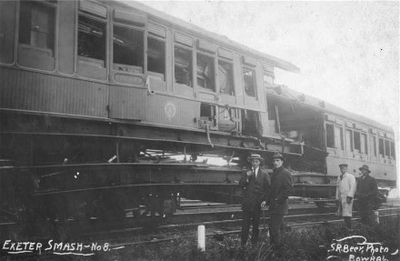
Exeter crossing loop collision
Encyclopedia
The Exeter crossing loop collision was a railway accident that occurred between the Temora
Mail Train and a goods train at Exeter railway station, New South Wales
, on 13 March 1914. At that time the main line was a single track, with a crossing loop and a down refuge siding at Exeter.
Faced with the knowledge that the Temora Mail would soon be due, the goods train was brought forward so that it could be reversed into a siding on the eastern side of the station yard. It was during this manouvre that the Temora Mail struck the goods train head-on.
 Questions were swiftly raised as to why two trains should collide when the goods train should have had the protection of the Home signal. The Mail train driver claimed that the Distant signal was Clear when he passed it, however as there was a thick fog at the time, he did not sight the Home signal, which was against him, until the train was right upon it.
Questions were swiftly raised as to why two trains should collide when the goods train should have had the protection of the Home signal. The Mail train driver claimed that the Distant signal was Clear when he passed it, however as there was a thick fog at the time, he did not sight the Home signal, which was against him, until the train was right upon it.
At a subsequent trial, the driver of the Mail was brought before the Goulburn Circuit Court charged with manslaughter. At that trial, the Night Officer at Exeter gave evidence to the effect that the Down Distant signal was in fact at Danger at the time the Mail train passed. The Night Officer further stated that there was no fog that night, but that just before the Goods train arrived a slight mist had set in. However, the Goods train driver gave conflicting evidence, stating that on the night of the accident the denseness of the fog made it difficult to see the signals.
Temora
Temora may refer to:* Temora, New South Wales, a town in Australia* Temora , listed on the NRHP in Maryland* Temora , a 1763 poem by James Macpherson* Temora , a genus of copepods in the family Temoridae...
Mail Train and a goods train at Exeter railway station, New South Wales
Exeter railway station, New South Wales
-Neighbouring stations:-Connecting Services:The station has an adjoining bus stop, which is served by a twice-daily South Coast to Southern Highlands CityRail bus route which operates via Robertson. This bus comes from Bundanoon in the early morning heading to Wollongong and a return service from...
, on 13 March 1914. At that time the main line was a single track, with a crossing loop and a down refuge siding at Exeter.
Events leading to Accident
The Up fast goods train was running late by the time it reached Exeter. Despite the train being too long to be accommodated in the loop at that station, the signaller [night-officer] turned the train into the loop. When the locomotive had reached the points at the Sydney end of the station, the rear of the train was still on the Main line at the southern end.Faced with the knowledge that the Temora Mail would soon be due, the goods train was brought forward so that it could be reversed into a siding on the eastern side of the station yard. It was during this manouvre that the Temora Mail struck the goods train head-on.
Questions

At a subsequent trial, the driver of the Mail was brought before the Goulburn Circuit Court charged with manslaughter. At that trial, the Night Officer at Exeter gave evidence to the effect that the Down Distant signal was in fact at Danger at the time the Mail train passed. The Night Officer further stated that there was no fog that night, but that just before the Goods train arrived a slight mist had set in. However, the Goods train driver gave conflicting evidence, stating that on the night of the accident the denseness of the fog made it difficult to see the signals.

